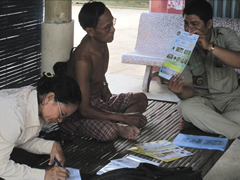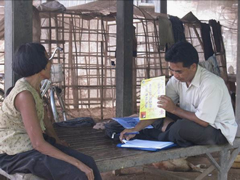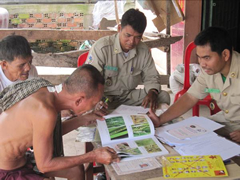Project News
2011-12-13
Impact Assessment Survey Implemented!
 CP staff having an interview with a retailer in Koh Thom, Kandal Province.
CP staff having an interview with a retailer in Koh Thom, Kandal Province.
The Project of Capacity Building for Quality Standard Control of Agricultural Materials (Chemical fertilizers and Pesticides) (QCAM Project) implemented a field survey to assess the impact of its awareness-raising activities on licensed retailers and users of chemical fertilizers and pesticides in the Kien Svay and Koh Thom districts of Kandal Province from October 5 to 11, 2011. At the same time, the mission members went to Siem Reap Province to conduct interviews with stakeholders in the Regional Economic Development Program (REDP) by the German International Cooperation Agency (GIZ ), which is using the information materials given by the QCAM Project.
It was interesting for us to evaluate if there has been any change in retailers' business philosophies and practices in dealing with these agricultural materials as a result of our awareness-raising activities, especially because it has been some time since we conducted the last monitoring survey in August, 2010. Thanks to the full cooperation of the provincial Department of Agriculture in Kandal Province, which is one counterpart (CP) for the QCAM Project, 64 retailers and 40 farmers were visited and interviewed. The main findings of the survey follow below.
First, it was found out that the number of licensed shops selling banned pesticides has decreased significantly since August, 2010. Of the 64 shops, only four licensed shops (6.3%) were selling the banned pesticides and only in Kien Svay this time versus 34 shops out of 55 (61.8%) in the two districts in August, 2010. At the same time, sales of banned pesticides have also decreased in the past year. There were only five banned pesticides by trade name in Kien Svay this time, a significant reduction from 13 in August, 2010. Furthermore, four banned pesticides by common name (Methamidophos, Mevinphos, Monocrotophos, and Paraquat) were identified this time but only in Kien Svay district, as compared to six (Methamidophos, Methidathion, Methomyl, Mevinphos, Monocrotophos, Paraquat) in August, 2010.
Second, regarding comprehension of the meaning of registered chemical fertilizers, 27 retailers (42.9%) out of sixty three, answered correctly, although there was a difference in the two districts. In Kien Svay, 11 retailers out of 37 (29.7%) responded correctly, while in Koh Thom, 16 retailers (61.5%) out of 26 did so. Regarding the meaning of banned pesticides, 43 shops (68.3%) out of 63 understood properly, although results were better in Koh Thom (84.6%) than in Kien Svay (56.8%).
 (Left and Right): CP staff having an interview with retailers in Kien Svay and Koh Thom, Kandal Province.
(Left and Right): CP staff having an interview with retailers in Kien Svay and Koh Thom, Kandal Province.

Finally, most retailers mentioned that all the information materials provided by the QCAM Project were "useful" or "very useful", not only for themselves but also for their customers. In particular, the Guide Book for Pest Management was very popular, with 39 retailers (88.6% of the 44 respondents) answering that it is "very useful" for their businesses, while 25 (56.8%) reported that it is "very useful" for their customers as well. There were also 23 retailers (35.9%) who watched the TV spot for the nation-wide campaign on eradicating banned pesticides in April 2011, even though it was broadcast for only a short period. In addition, it was found out that the information materials of the QCAM Project have been effectively utilized by inspectors of the PDA Kandal, as well as by the REDP.
Overall, the situations of sales of banned pesticides are now much improved, while awareness by the licensed retailers has also grown in the last three years, thanks to the QCAM Project. However, it must be noted that without ongoing efforts to inspect agricultural materials, the current positive trend will not last for a long time. Therefore, it is important for the MAFF to continue its inspection and awareness-raising activities of potentially hazardous agricultural materials not only in Kien Svay and Koh Thom districts, but also in other places by making full use of the information materials of the QCAM Project. At the same time, the QCAM Project will continue to provide technical support to the MAFF through the end of the Project in March, 2012.
Written by Toshinori Hamaguchi, JICA Expert
- About JICA
- News & Features
- Countries & Regions
- Our Work
- Thematic Issues
- Types of Assistance
- Partnerships with Other Development Partners
- Climate Change / Environmental and Social Considerations
- Evaluations
- Compliance and Anti-corruption
- Science and Technology Cooperation on Global Issues
- Research
- JICA Development Studies Program / JICA Chair
- Support for the Acceptance of Foreign HRs / Multicultural and Inclusive Community
- Publications
- Investor Relations
